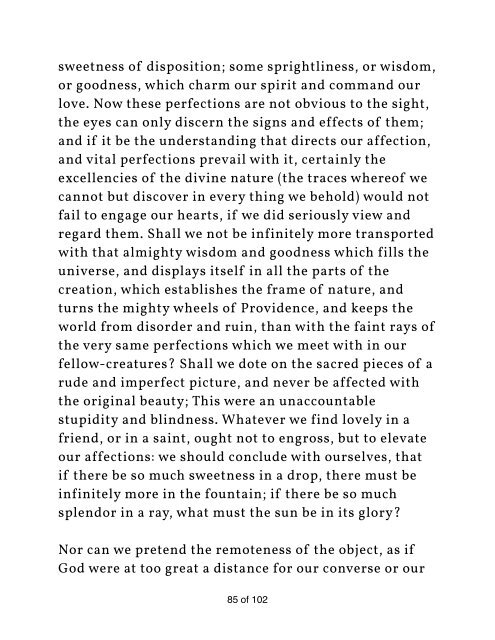The Life of God in the Soul of Man by Henry Scougal
The book instrumental in George Whitefield’s conversion The Life of God in the Soul of Man (1677), was originally written as a private letter to a ‘dear’ friend, to explain Christianity. It was never intended for publication. Yet it has become a classic Puritan text and one of the most read and influential treatises ever written for the comfort of God’s saints.
The book instrumental in George Whitefield’s conversion The Life of God in the Soul of Man (1677), was originally written as a private letter to a ‘dear’ friend, to explain Christianity. It was never intended for publication. Yet it has become a classic Puritan text and one of the most read and influential treatises ever written for the comfort of God’s saints.
You also want an ePaper? Increase the reach of your titles
YUMPU automatically turns print PDFs into web optimized ePapers that Google loves.
sweetness <strong>of</strong> disposition; some sprightl<strong>in</strong>ess, or wisdom,<br />
or goodness, which charm our spirit and command our<br />
love. Now <strong>the</strong>se perfections are not obvious to <strong>the</strong> sight,<br />
<strong>the</strong> eyes can only discern <strong>the</strong> signs and effects <strong>of</strong> <strong>the</strong>m;<br />
and if it be <strong>the</strong> understand<strong>in</strong>g that directs our affection,<br />
and vital perfections prevail with it, certa<strong>in</strong>ly <strong>the</strong><br />
excellencies <strong>of</strong> <strong>the</strong> div<strong>in</strong>e nature (<strong>the</strong> traces where<strong>of</strong> we<br />
cannot but discover <strong>in</strong> every th<strong>in</strong>g we behold) would not<br />
fail to engage our hearts, if we did seriously view and<br />
regard <strong>the</strong>m. Shall we not be <strong>in</strong>f<strong>in</strong>itely more transported<br />
with that almighty wisdom and goodness which fills <strong>the</strong><br />
universe, and displays itself <strong>in</strong> all <strong>the</strong> parts <strong>of</strong> <strong>the</strong><br />
creation, which establishes <strong>the</strong> frame <strong>of</strong> nature, and<br />
turns <strong>the</strong> mighty wheels <strong>of</strong> Providence, and keeps <strong>the</strong><br />
world from disorder and ru<strong>in</strong>, than with <strong>the</strong> fa<strong>in</strong>t rays <strong>of</strong><br />
<strong>the</strong> very same perfections which we meet with <strong>in</strong> our<br />
fellow-creatures? Shall we dote on <strong>the</strong> sacred pieces <strong>of</strong> a<br />
rude and imperfect picture, and never be affected with<br />
<strong>the</strong> orig<strong>in</strong>al beauty; This were an unaccountable<br />
stupidity and bl<strong>in</strong>dness. Whatever we f<strong>in</strong>d lovely <strong>in</strong> a<br />
friend, or <strong>in</strong> a sa<strong>in</strong>t, ought not to engross, but to elevate<br />
our affections: we should conclude with ourselves, that<br />
if <strong>the</strong>re be so much sweetness <strong>in</strong> a drop, <strong>the</strong>re must be<br />
<strong>in</strong>f<strong>in</strong>itely more <strong>in</strong> <strong>the</strong> founta<strong>in</strong>; if <strong>the</strong>re be so much<br />
splendor <strong>in</strong> a ray, what must <strong>the</strong> sun be <strong>in</strong> its glory?<br />
Nor can we pretend <strong>the</strong> remoteness <strong>of</strong> <strong>the</strong> object, as if<br />
<strong>God</strong> were at too great a distance for our converse or our<br />
85 <strong>of</strong> 102

















